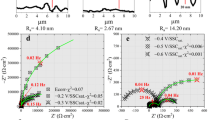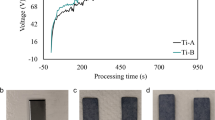Abstract
THE anodic oxidation of titanium in the majority of electrolytes (sulphuric, phosphoric, boric acid, etc.) results in the formation of a thin homogeneous dielectric oxide film of titanium dioxide (amorphous or crystalline). At constant current the potential increases with increasing film thickness, and, if the potential is then maintained constant, the ionic current decreases rapidly and the current becomes almost entirely electronic. In these circumstances, providing film breakdown does not occur, film growth practically ceases and oxygen evolution becomes the predominant electrode process.
This is a preview of subscription content, access via your institution
Access options
Subscribe to this journal
Receive 51 print issues and online access
$199.00 per year
only $3.90 per issue
Buy this article
- Purchase on Springer Link
- Instant access to full article PDF
Prices may be subject to local taxes which are calculated during checkout
Similar content being viewed by others
References
Lane, I. R., Golden, L. B., and Ackerman, W. L., Indust. Eng. Chem., 45, 1067 (1953).
Müller, E., Z. Elektrochem., 33, 561 (1927).
Herasymenko, P., Ukrainskii Kem. Zhur., 4, Sci. Pt., 439 (1929).
B.P. App. No. 19688/59 and 53/60.
Author information
Authors and Affiliations
Rights and permissions
About this article
Cite this article
PIGGOTT, R., SHREIR, L. Micropitting of Titanium during Anodic Oxidation in Formic Acid. Nature 189, 216–217 (1961). https://doi.org/10.1038/189216a0
Issue Date:
DOI: https://doi.org/10.1038/189216a0
This article is cited by
-
Anodic oxidation of titanium and its alloys
Journal of Materials Science (1973)
Comments
By submitting a comment you agree to abide by our Terms and Community Guidelines. If you find something abusive or that does not comply with our terms or guidelines please flag it as inappropriate.



